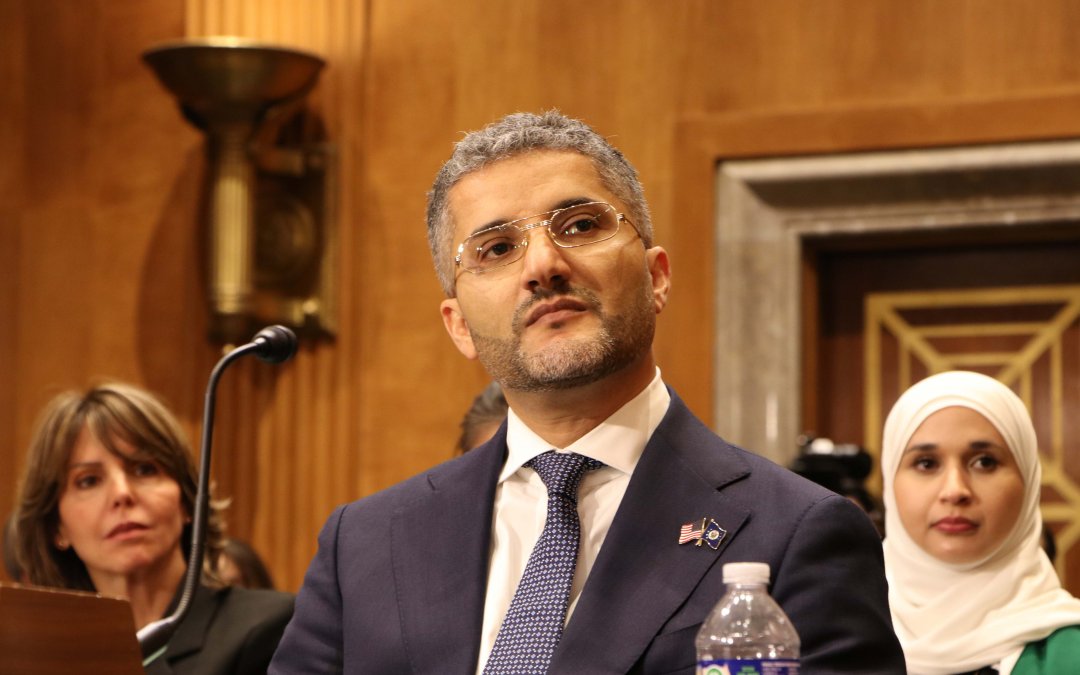WASHINGTON — Hamtramck, Michigan, Mayor Amer Ghalib forcefully defended past comments and years of social media activity during intense questioning by lawmakers at his confirmation hearing to be the next U.S. Ambassador to Kuwait on Thursday.
Ghalib faced scrutiny from eight members of the Senate Committee on Foreign Relations over his past statements on conflicts in the Middle East, including the war in Gaza. His nomination hearing was postponed in September after criticism from several groups committed to fighting antisemitism, including the Anti-Defamation League, the American Jewish Committee, and StopAntisemitism.
Ranking Member Sen. Jeanne Shaheen (D-N.H.) told Ghalib, “I have grave concerns about some of the statements that you have made, particularly those that seem to justify the October 7th attack against Israel.”
Shaheen referenced quotes from Ghalib’s “hometown news outlet.” The Hamtramck Review reported in May that at a pro-Palestinian rally in 2023, Ghalib allegedly “justified Palestinian violence against Israel for its brutality against Palestinians, and denied that sexual violence happened against Israelis when Hamas militants invaded Israel on Oct. 7.”
Ghalib said he “totally condemn[s] what happened on October 7th.” He also said some of his statements were taken out of context and claimed the “media was biased in translating.”
Despite Ghalib’s reassurances, senators from both parties said they would not support his nomination, including Sen. Ted Cruz (R-Texas), who said he was “concerned that [Ghalib’s] stated public positions are markedly in conflict with the views of President Trump and with the positions of the United States.”
Ghalib replied, “I wouldn’t go against the President and his policies.”
Other Republican senators also said they’re worried Ghalib’s perspectives on the Middle East will contradict the messages the Trump administration hopes to convey overseas.
Sens. Dave McCormick (R-Penn.) and Cruz questioned Ghalib about allegedly liking a social media post comparing Jewish people to monkeys.
Ghalib called his previous social media activity, including his tendency to like every comment underneath his posts, a “bad habit.” He also said many of his controversial posts were made while he was a “private citizen,” before he was elected Hamtramck Mayor in 2021.
Multiple senators also referenced a post in which Ghalib allegedly called Saddam Hussein, the former leader of Iraq, a “martyr.” Ghalib said he made the post “in a moment of anger” after Iran launched missile strikes aimed at U.S. troops in Iraq in response to the U.S. killing of top Iranian general Quassem Suleimani in January 2020.
“As a private citizen, it is fine for you to have those views,” Sen. Shaheen said. “But it is very different when you are an ambassador representing the United States of America, particularly in a country that Saddam Hussein invaded.”
“I complimented Saddam because he kept Iran in check,” Ghalib said, “and probably that’s the only positive thing he did in his life.”
Ghalib, a Democrat and immigrant from Yemen, endorsed Trump for president and campaigned with him in Hamtramck in October 2024. Trump credited the Hamtramck Mayor with helping him win Michigan and nominated Ghalib for the ambassador role in March.
Ghalib is the third Michigander appointed to a diplomatic position in the Middle East by the Trump administration this year. Bill Bazzi, former mayor of Dearborn Heights, was confirmed as the U.S. Ambassador to Tunisia this month. This week, Trump also appointed Mark Savaya, owner of Leaf and Bud dispensaries throughout southeast Michigan, as the U.S. special envoy to Iraq.
According to Ghalib, the president personally reaffirmed his commitment to the nominee earlier in the month following criticism from several groups. “President Trump has just called me and emphasized his unwavering support to me to serve as the next Ambassador of the United States to the state of Kuwait, and he thanked our community for their support,” Ghalib wrote in a Facebook post.
Ghalib’s confirmation could take weeks or even months. Ghalib must receive a majority of votes from the Senate Committee on Foreign Relations before his nomination can be voted on by the full Senate. It is unclear when that will take place.


